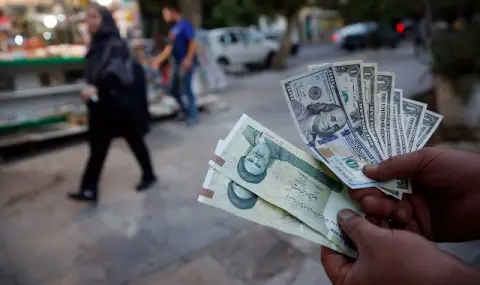Candidates in Iran's presidential election on Friday pledged to revive the sagging economy, but voters see little prospect of easing economic pressures on the cost of living without lifting sanctions and easing Iran's international isolation.< /p>
The daily struggle of ordinary Iranians to make ends meet is a constant challenge for Iran's ruling clerics, who fear a resurgence of protests that have periodically erupted among lower- and middle-income communities angered by continued hardship.
The reimposition of US sanctions in 2018 hit Iran's oil exports, reducing government revenue and forcing it to take unpopular steps such as raising taxes and running a large budget deficit, a policy that has kept annual inflation close to 40 %.
Although the country has avoided a full economic collapse, largely thanks to oil exports to China and higher crude prices, oil exports are still below their pre-2018 levels.
Most of the candidates trying to replace Ebrahim Raisi after his death in a helicopter crash last month say they plan to emulate his policies of economic self-reliance and more business ties with Asia. Others defend a broader relationship with the world without offering practical steps to deal with sanctions.
During Raisi's three years in office, Iran's economy emerged from the 2018-2019 crisis caused by the 2018 reimposition of sanctions and growth peaked at 5.7% in the year ended March , according to data from the Statistical Center of Iran.
However, most of this expansion came from the energy sector, as the country saw a 70% increase in oil production, which now stands at around 3.5 million barrels per day, with oil exports exceeding 1 .4 million barrels per day and is mainly aimed at China.
Without hydrocarbons, Iran's growth last year would have been only 3.4%, and its trade balance would have reached a deficit of $16.8 billion, noted Mohammad Rezvanifar, head of Iran's customs service. Foreign direct investment has also stagnated, amounting to $1.5 billion in 2022, according to the United Nations Conference on Trade and Development (UNCTAD).
FALLING PURCHASING POWER
According to the World Bank, unemployment is currently hovering around 7.6%, compared to 9.6% when Raisi was elected. However, civil servants are paid a pittance, meaning the true number of people without enough work to support themselves is likely much higher.
"It is not difficult to understand why most Iranians are angry," said Javad Salehi Isfahani, an economics professor at Virginia Tech.
"Living standards and poverty may have improved in the last two years, but that is not true if we go back a decade or two. The new president may inspire hope and stop things from getting worse, but not return Iran to the year 2000.
Salehi Isfahani added that it was a more prosperous period.
Iranians' purchasing power has continued to shrink under Raisi's rule, with the free market rate of the Iranian rial halving and more, according to the Iranian currency tracking website Bonbast, now worth 600 000 riyals for one dollar.
The prices of basic goods such as dairy products, rice and meat have risen in recent months. The subsidized price of so-called lavash bread, the most popular among Iranian households, has risen by at least about 230% in the past three years, and red meat has become too expensive for many, rising 440% to $10 a kilo.
A teacher's monthly salary is about $180, and many construction workers earn little more than $10 a day.
The candidates promised to implement the seventh development plan of the country, approved last year by the parliament. It aims to limit inflation and develop exports and sets ambitious targets for achieving 8% annual growth under the sanctions.
But World Bank forecasts for the next three years see annual growth below 3.2% for Iran as a result of weak global demand, sanctions and domestic energy shortages.
Voters interviewed by Reuters said the state of the economy was linked to the country's diplomatic standing, which is strongly anti-Western and is set by Iran's Supreme Leader Ayatollah Ali Khamenei, who is the country's supreme leader.
p>
During his three years in office, Raisi, who has been loyal to Khamenei, has vowed not to tie the economy to nuclear talks with world powers, even though the talks could lift most US restrictions by reviving the 2015 containment pact of Tehran's nuclear program.
CONSCIOUSNESS IN POLITICS
"The economy is heavily influenced by foreign policy because there is no successful strategy to reduce the destructive impact of sanctions," said Mohammad, an administrator at Rudehen Islamic University in Tehran province. Like other voters interviewed, he did not want to use his full name because of the sensitive nature of the issue.
The snap vote gave candidates little time to prepare detailed economic plans. Most said the economy needed to become more self-reliant before Iran tried to lift sanctions imposed over Tehran's disputed nuclear program, while tight-lipped moderate Massoud Pezeshkian and hardline cleric Mostafa Pourmohammadi were more outspoken on the need to open up foreign relations to help the economy.
The pre-election debates focused mainly on fiscal imbalances, resource mismanagement and bribery, domestic problems that many Iranians believe are deep-rooted and amenable to reform.
"As long as government policy does not effectively support competition, transparency and investment security, things will only get worse," said Peiman, a city engineer in Tehran.
Mehdi Ghazanfari, chairman of the Independent Investment Fund of Iran, told state media that the lack of developed political parties meant that candidates in the election would not determine future ministers or policy in advance, and the winner would usually rush to appoint a cabinet, "which is ultimately incoherent".
Iran's economic outlook looks even more uncertain, analysts say, as the possible return of Donald Trump as US president is likely to lead to tougher enforcement of oil sanctions, former Iranian Foreign Minister Mohammad Javad Zarif said in defense of the campaign. of Pezeshkian.
Translation from English: Svetoslav Tanchev, BTA
